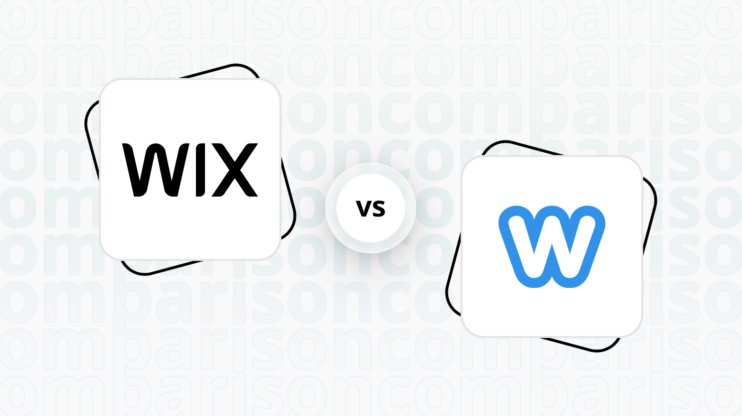WordPress vs Weebly: Final verdict
WordPress and Weebly both offer robust platforms, but they cater to different user needs and preferences.
-
WordPress (Overall Grade: 7.1/10)
is an open-source CMS that excels in customization and flexibility. It is ideal for users who want extensive control over their website’s design and functionality. With a vast array of plugins and themes, WordPress is suitable for blogs, business sites, and online stores. However, it has a steeper learning curve and requires separate purchases for hosting and domain, making it more complex for beginners. -
Weebly (Overall Grade: 7.3/10)
is a user-friendly website builder with a drag-and-drop interface, making it accessible for both beginners and experienced users. It offers a variety of themes, ecommerce features, and SEO tools, making it a strong contender for small businesses and personal websites. Weebly’s straightforward pricing and included hosting make it a convenient choice, though it has fewer customization options compared to WordPress.

|

|
|
|---|---|---|
|
Design functionalities & templates |
9.0 |
7.4 |
|
Ease of use |
7.2 |
8.1 |
|
Ecommerce |
8.4 |
7.1 |
|
Website Editors |
8.5 |
7.6 |
|
Product testing options |
8.1 |
8.3 |
|
Price |
5.9 |
8.4 |
|
Hosting quality |
0 |
7.7 |
|
Website speed optimization |
6.5 |
7.9 |
|
Plugins and integrations |
8.8 |
7.5 |
|
Marketing features |
8.0 |
7.1 |
|
Customer support |
5.0 |
7.3 |
|
Security |
6.7 |
8.3 |
|
AI capabilities |
6.1 |
1.8 |
|
User Management |
8.8 |
6.5 |
Which one is the best for ecommerce: WordPress or Weebly?
 8.4
8.4
 7.1
7.1
Verdict
: Weebly is user-friendly and suitable for beginners, while WordPress offers extensive customization and scalability for more advanced ecommerce needs.
-
WordPress
: With its WooCommerce plugin, WordPress provides a robust ecommerce solution that supports multiple payment gateways and offers features like abandoned cart recovery and ecommerce analytics. It is highly customizable, making it ideal for businesses looking for flexibility and scalability. However, when comparing WordPress vs Weebly, WordPress might require more technical knowledge to fully utilize its capabilities. -
Weebly
: Known for its user-friendly interface, Weebly is perfect for those new to ecommerce. It offers essential ecommerce features such as inventory management, secure checkout, and basic analytics. However, it lacks the advanced customization options available with WordPress, making it less suitable for complex ecommerce needs.
Which one is the best for informational and business websites?
 9.2
9.2
 7.9
7.9
Verdict
: When it comes to creating informational and business websites, WordPress stands out as the superior choice due to its extensive customization options and robust plugin ecosystem. Weebly, while user-friendly and accessible, falls short in comparison but still offers a solid option for those seeking simplicity and ease of use.
-
WordPress
: WordPress excels in providing a highly customizable platform with a vast array of themes and plugins, making it ideal for creating detailed and feature-rich informational websites. Its open-source nature allows for extensive creative control, catering to a wide range of website types. With a score of 9.2, WordPress is particularly suitable for users who need advanced functionalities and are comfortable with a steeper learning curve. -
Weebly
: Weebly offers a more straightforward, drag-and-drop interface, making it accessible for beginners. It provides a curated selection of high-quality templates and essential features for building and managing websites. Scoring 7.9, Weebly is a good choice for users who prioritize ease of use and do not require the extensive customization options that WordPress offers. When comparing WordPress vs Weebly, Weebly’s simplicity and user-friendly design make it a viable option for those new to website building.
WordPress vs Weebly: Detailed comparison
Design functionalities & templates
Design FunctionalitiesRepresents how well each platform allows for creative design and customization of websites.Score Components:
- Template Variety (30%): Range and quality of design templates.
- Customization (30%): Flexibility and options for design alterations.
- User Interface (20%): Ease and intuitiveness of the design process.
- Responsiveness (10%): Adaptability to different devices and screen sizes.
- Innovation (10%): Unique design features and tools.
 9.0
9.0
 7.4
7.4
🏆
Winner: WordPress.
If you’re looking for a platform that offers more creative control, extensive customization options, and a wide array of design features, WordPress is the preferred choice.
WordPress offers an extensive variety of templates and designs, catering to a wide range of website types beyond just blogs or ecommerce. Its open-source nature allows for high customization and creative freedom, appealing to diverse user needs. While WordPress itself doesn’t sell premium templates, numerous third-party theme shops offer sophisticated and specialized design choices, expanding the possibilities for users.
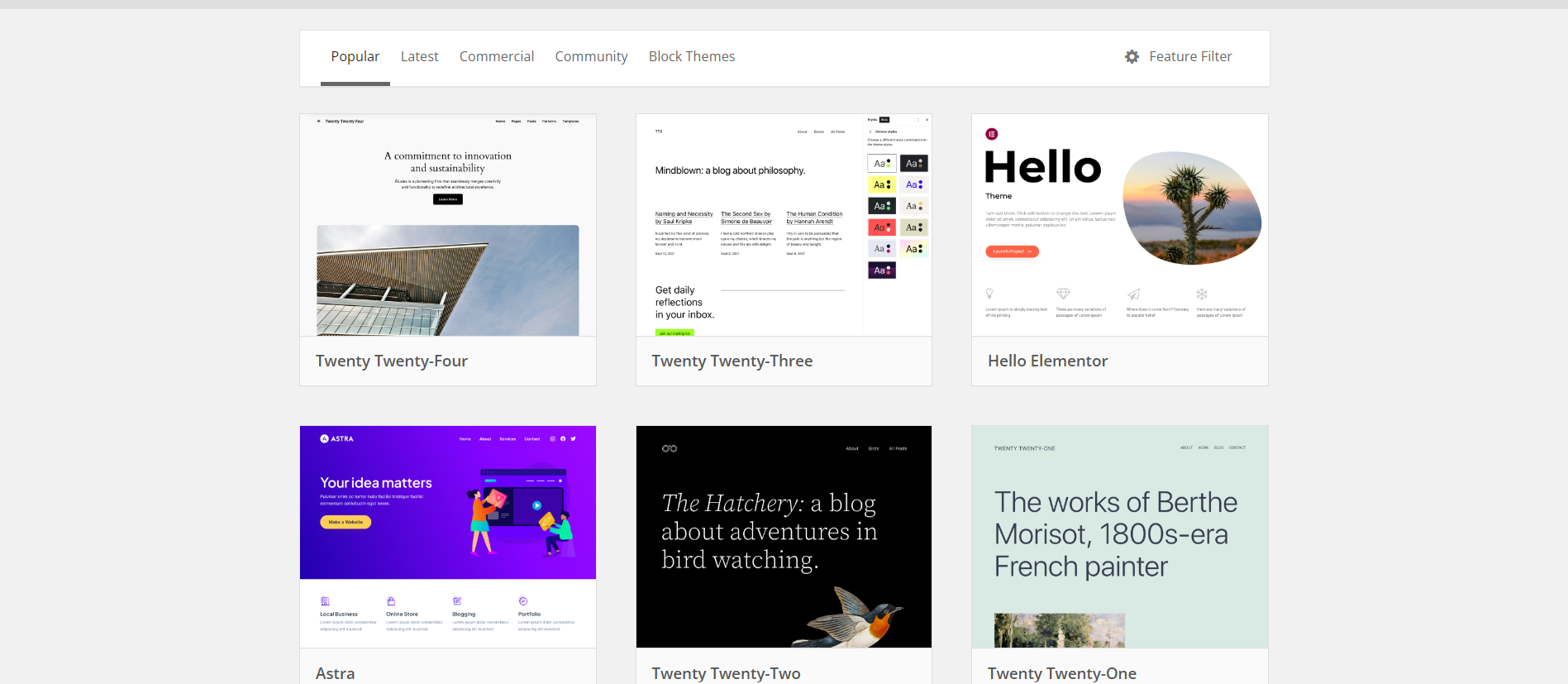
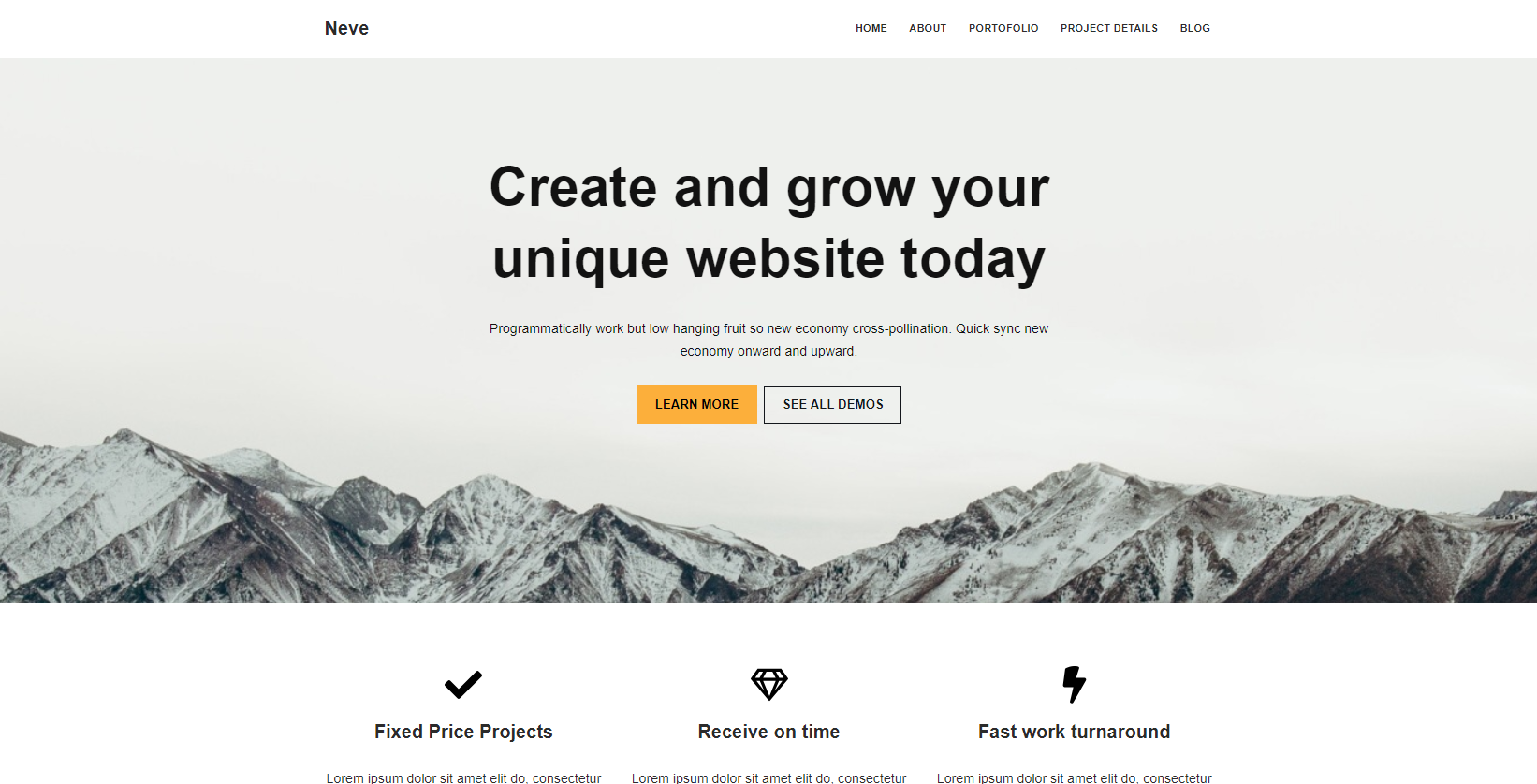
Compared to WordPress, Weebly offers a curated selection of templates, numbering in the low hundreds, which is fewer than some competitors. However, the emphasis is on high-quality, professionally designed templates covering various categories such as business, ecommerce, portfolio, blog, personal, and events. Weebly’s templates are praised for their clean, modern, and responsive design, with easy customization options for colors, fonts, layout, images, and content.
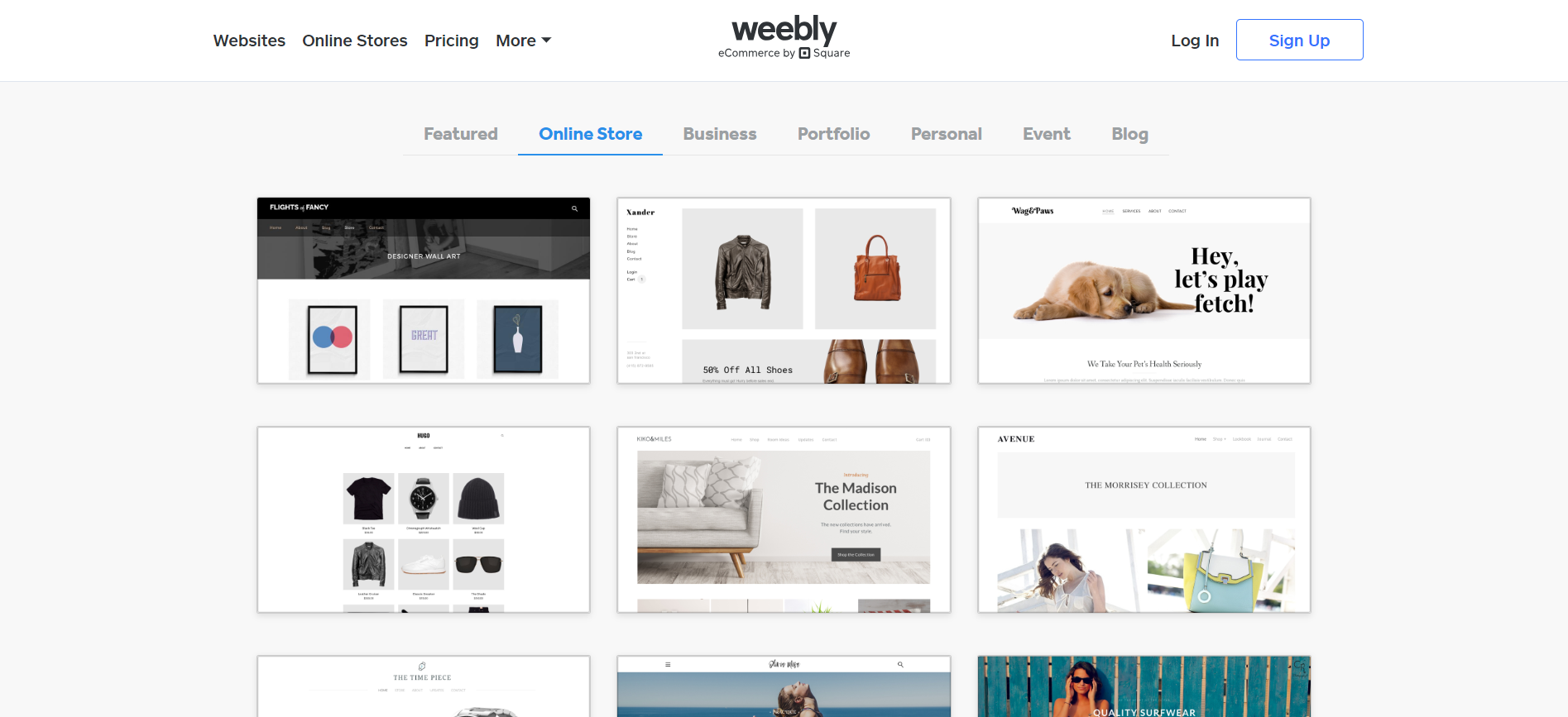

Get a head start on website creation with AI
Create a custom website tailored to your business needs 10X faster with 10Web AI Website Builder!
Ease of use
Ease of useReflects the platform’s overall user-friendliness.Score
Components:
- Learning curve (40%): Quickness and ease of getting started.
- Interface design (30%): Simplicity and intuitiveness of layout.
- User guidance (20%): Quality of tutorials and support.
- Flexibility (10%): Adaptability to various user skills.
 7.2
7.2
 8.1
8.1
🏆 Winner: Weebly
. With a score of 8.1, Weebly’s user-friendly interface and drag-and-drop design make it more accessible for beginners compared to WordPress, which scored 7.2. While WordPress offers extensive customization options, it has a steeper learning curve, making Weebly the winner in this category.
Learning Resources
🏆 Winner: WordPress
. Both platforms offer a variety of learning resources, but WordPress stands out with its vast array of detailed documentation, community forums, online tutorials, and courses. This extensive support network is beneficial for users of all skill levels.
For ecommerce
EcommerceMeasures the platform’s effectiveness in supporting online business activities.Score Components:
- Ecommerce themes and templates (20%): Variety and design of templates.
- Product management (25%): Ease of managing and organizing products.
- Payment options (25%): Variety and convenience of payment methods.
- Ecommerce features (20%): Features for managing an ecommerce store.
- Integration (10%): Compatibility with external e-commerce tools and services.
 8.4
8.4
 7.1
7.1
WordPress, with its WooCommerce plugin, offers a robust ecommerce solution with extensive customization options. It supports multiple payment gateways and provides features like abandoned cart recovery and ecommerce analytics. Weebly, while user-friendly, has limitations in design flexibility and certain advanced features are only available with paid plans.

|

|
|
|---|---|---|
|
Ecommerce themes and templates |
9.2 |
6.5 |
|
Product page customization |
9.0 |
6.8 |
|
Payment processing and commissions |
7.5 |
7.0 |
|
POS capabilities |
6.5 |
6.0 |
|
Payment gateways |
8.5 |
7.5 |
|
Product numbers |
7.0 |
7.0 |
|
Additional ecommerce features |
8.0 |
6.7 |
WordPress ecommerce features:
- WooCommerce Integration
- Multiple Payment Gateway Support
- Abandoned Cart Recovery
- Ecommerce Analytics
- SEO Optimization Tools
- Extensive Plugin Ecosystem
Weebly ecommerce features:
- Unlimited products
- Inventory management
- Product reviews and ratings (Paid plans)
- Secure checkout
- Shipping options
- Abandoned cart recovery (Paid plans)
- Basic analytics
- SEO tools
- Marketing integrations (Paid plans)
Ecommerce themes & templates
WordPress offers hundreds to potentially thousands of ecommerce and WooCommerce specific themes and templates, both free and premium. Weebly, on the other hand, provides ecommerce-specific themes with a decent range of styles, offering built-in features like product galleries and optimized checkout flows. However, Weebly has a smaller theme selection and less design flexibility compared to WordPress.
Product page customization
WooCommerce on WordPress offers extensive customization for eCommerce product pages, including product tabs, upsells, and related products. Weebly allows a decent level of product page customization through its user-friendly interface, but it’s not as extensive as WordPress. Advanced customization, including custom CSS and app integrations, is available with Weebly’s paid plans.
Payment processing
WordPress doesn’t handle payments directly but offers plugin options for payment processing, including popular gateways like PayPal, Stripe, Authorize.Net, and Square. Weebly seamlessly integrates with popular payment processors such as Square, Stripe, PayPal, and others, enabling secure and convenient online transactions for your store. Users can set up payment processing within Weebly’s settings and benefit from features like secure checkout and, on paid plans, options for recurring payments and international transactions.
Website Editors
Website EditorsEvaluates the platforms’ website building and editing capabilities.Score Components:
- Customization tools (40%): Range and power of editing features.
- Editor usability (30%): User experience within the editor.
- Design flexibility (20%): Freedom in layout and design changes.
- Update and maintenance ease (10%): Simplicity of updating and maintaining the site.
 8.5
8.5
 7.6
7.6
🏆
Winner: WordPress
. WordPress, with a score of 8.5, offers a user-friendly interface with block-based editing, extensive styles customization, template management, page editing/creation, distraction-free modes, versatile saving options, and accessibility for users of varying skill levels. It also provides a wide range of blocks and widgets for creating websites, and allows for extensive custom code possibilities.
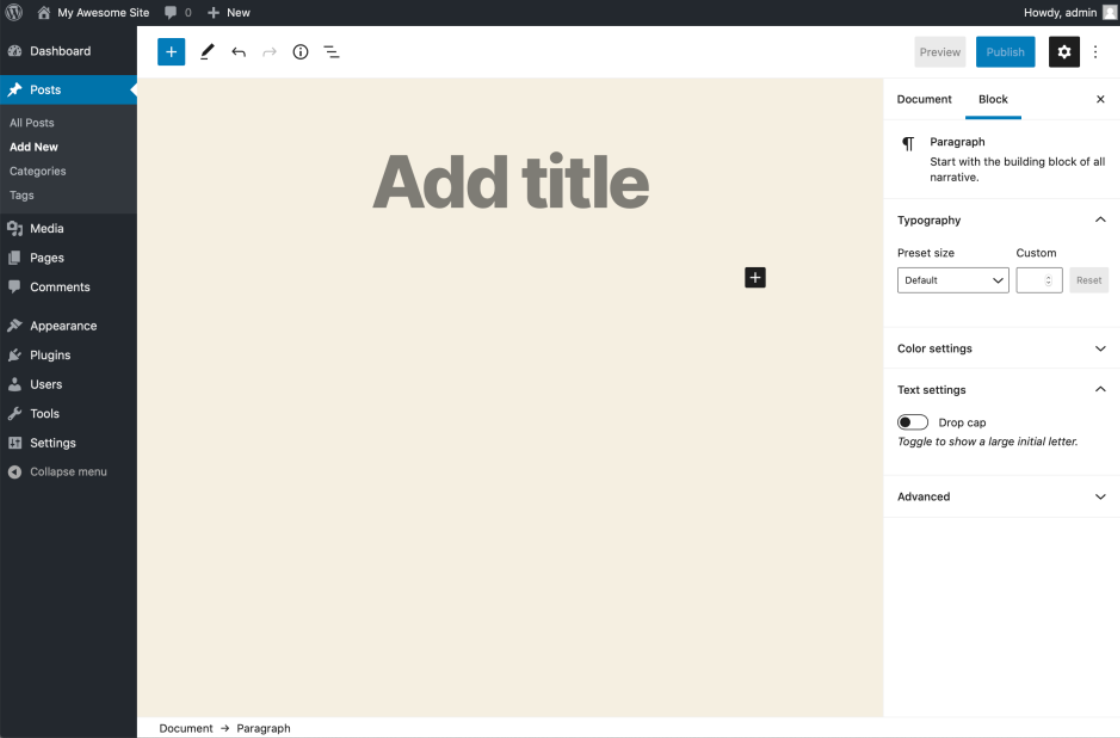
Weebly’s editor, scoring 7.6, stands out for its drag-and-drop simplicity, catering to beginners with an intuitive interface and visual editing. The editor features a range of pre-designed templates, customization options, and content management tools. However, it has some limitations in design flexibility and advanced features, with certain functionalities requiring a move to paid plans.
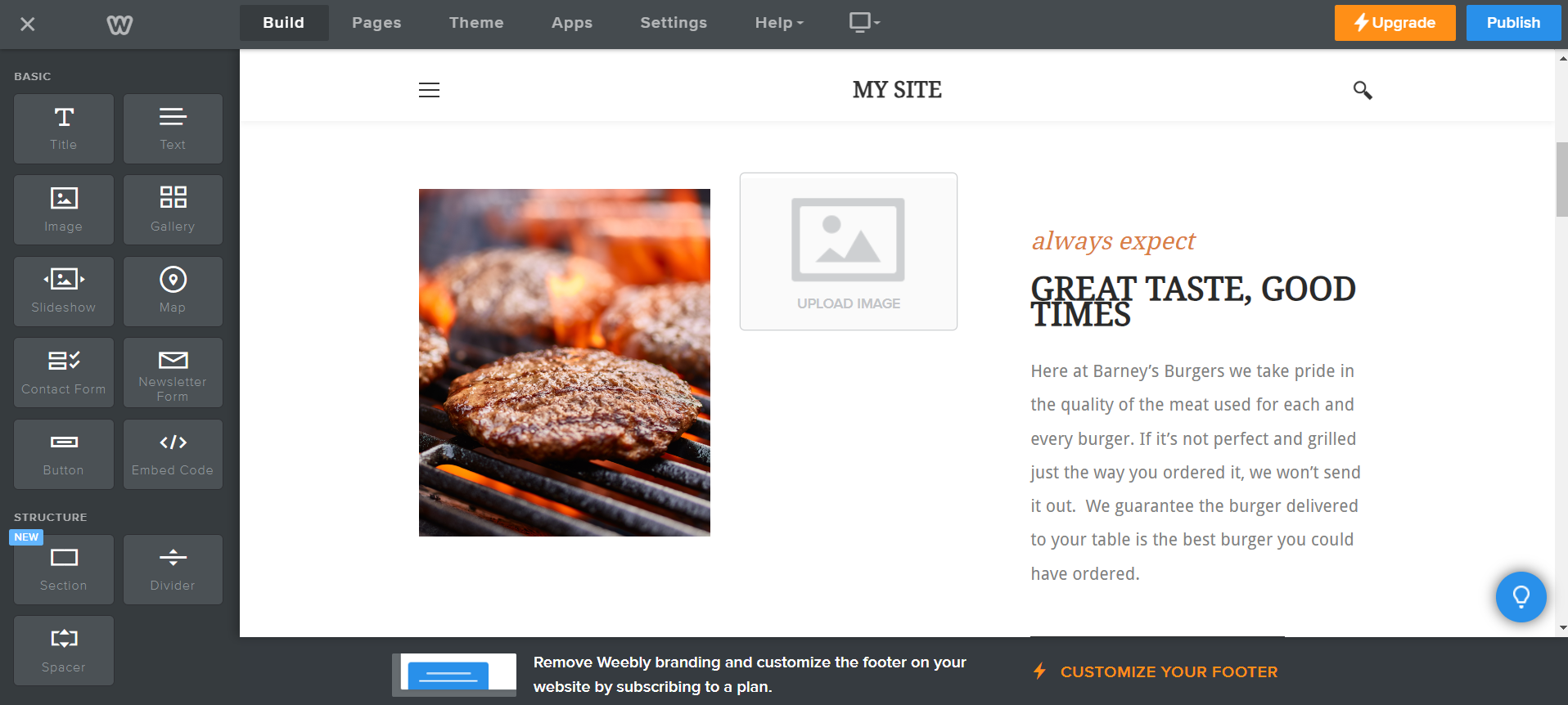
Mobile editor/app
 8.1
8.1
 8.1
8.1
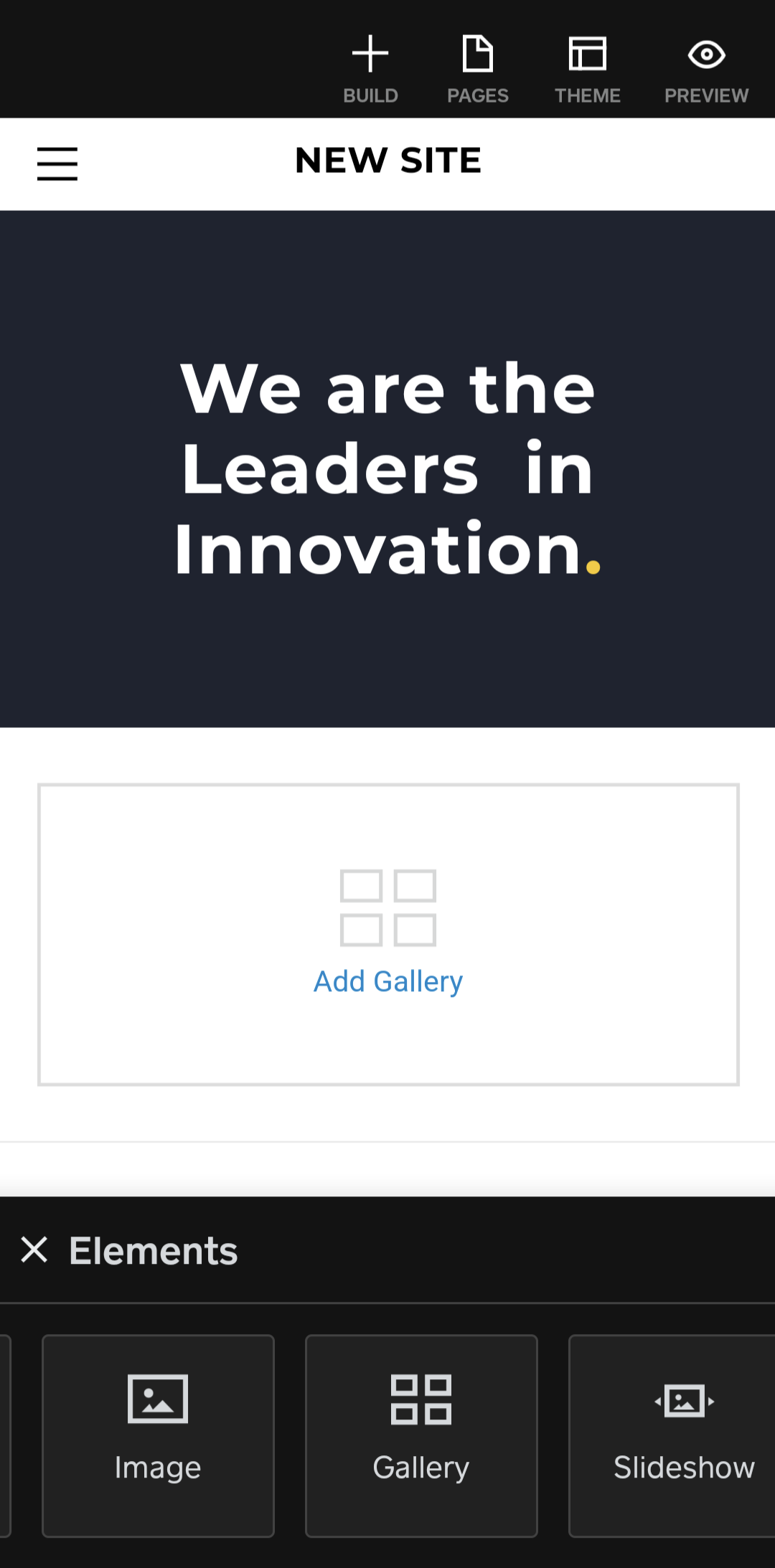
🏁
Draw: WordPress vs Weebly
. Both WordPress and Weebly offer mobile apps that allow users to manage their websites on the go. However, both apps have limitations compared to their web-based counterparts.
The WordPress Mobile Editor App allows users to create and edit posts, manage comments, schedule content, and analyze website traffic. While it offers convenience and basic functionality, it has some limitations compared to the web-based editor, including fewer advanced options, restricted code access, and limited design customization.
Weebly’s mobile app allows users to manage and make basic edits to their websites on the go. While it offers features like content management and basic design customization, it has limitations, such as no advanced editing capabilities or extensive design flexibility, making it best suited for quick content updates rather than major design changes.
In summary, both WordPress and Weebly offer similar capabilities in terms of mobile editing, hence the draw.
Product testing options
Product Testing OptionsAssesses the options for trying out platform features before commitment.Score Components:
- Trial quality (40%): Extent and usefulness of the trial or free version.
- Feature accessibility (30%): How many features are available to test.
- Trial duration (20%): Length of the trial period.
- Ease of transition (10%): Smoothness of moving from trial to paid plans.
 8.1
8.1
 8.3
8.3
Overall Result
:
Weebly wins
. Weebly scores 8.3, slightly higher than WordPress’s 8.1. While both platforms offer a free version, Weebly stands out with its 30-day money-back guarantee, which allows users to explore all features of any paid plan and get a full refund if not satisfied. On the other hand, WordPress, being an open-source CMS, does not offer a trial version or the possibility to test premium features.

|

|
|
|---|---|---|
|
Free Plan |
Yes (open source software) |
Yes |
|
Trial Duration |
No |
No (30-day money-back guarantee) |
|
Testing Premium Features |
No |
Yes, within the 30-day refund window |
Price
PriceLooks at the cost-effectiveness and value for money of each platform.Score Components:
- Plan value (40%): What each pricing tier offers.
- Transparency and clarity (30%): Clearness of pricing structures.
- Flexibility of plans (20%): Range of options to suit different budgets.
- Hidden costs (10%): Additional expenses not included in the plan.
 5.9
5.9
 8.4
8.4
Weebly offers a more straightforward pricing structure with clear plans and features, while WordPress is free but requires separate purchases for hosting, domain, and website builder subscriptions.

|

|
|
|---|---|---|
|
Free |
Free Plan ($0/month): WordPress is open source software that is free. WordPress does not provide hosting services; so, it is necessary to purchase a domain, web hosting, and website builder subscriptions separately. While WordPress lacks built-in ecommerce, plugins like WooCommerce offer a solution. WordPress offers an extensive variety of templates and designs. WordPress lacks a built-in AI-assisted builder, but its open-source nature allows for an ecosystem of plugins and themes incorporating AI for website building. |
Free ($0/month): Basic template selection, 500MB storage, Weebly ads, limited features. |
|
$0-$10 |
No offering at this amount. |
Personal ($6/month): Custom domain, unlimited storage, ad-free, limited SEO and email marketing tools. Value for price: 6.5 |
|
$10-$20 |
No offering at this amount. |
Professional ($12/month): Advanced design options, blog membership features, advanced SEO tools, form analytics. Value for price: 7.5 |
|
$20+ |
No offering at this amount. |
Performance ($26/month): Advanced ecommerce features, lead capture tools, custom code injection, marketing automation. Value for price: 8.5 |
location. As a result in rare cases the prices displayed here can differ from the ones you see on their
websites.
Hosting quality
Hosting
qualityExamines the reliability and performance of the hosting solutions.Score Components:
- Uptime (40%): Consistency and reliability of website availability.
- Speed (30%): Loading times and performance.
- Bandwidth and storage (20%): Sufficiency of resources provided.
- Data centers (10%): Quality and distribution of hosting infrastructure.
 0
0
 7.7
7.7
Winner: Weebly
. Weebly offers hosting included in all of their plans with unlimited storage and bandwidth on its paid plans. However, Weebly has been critiqued for slow page loading times, which could impact SEO negatively. Weebly does not have automated backup services, but users can export the site to a zip file. Weebly leverages a global network of data centers to deliver reliable and efficient website hosting. However, they do not publicly disclose the specific locations of their data centers due to security and technical reasons. On the other hand, WordPress does not directly provide hosting services, and its uptime, uptime guarantee, and data centers depend on the hosting provider chosen by the user.

|

|
|
|---|---|---|
|
Do they offer hosting? |
No, WordPress itself does not directly provide hosting services. | Yes, included in all paid plans, free plan with limited features |
|
Data Centers: |
Data centers depend on hosting providers | Weebly leverages a global network of data centers to deliver reliable and efficient website hosting. However, they do not publicly disclose the specific locations of their data centers due to security and technical reasons. |
|
Type of hosting: |
WordPress itself isn’t a hosting platform, there are various options when choosing the type of hosting for websites built with WordPress, such as: Shared Hosting, VPS Hosting, Dedicated Server Hosting, Managed WordPress Hosting, Cloud Hosting | Shared Hosting, Cloud Based Hosting, Managed Hosting |
|
Uptime: |
Uptime & uptime guarantee depends on hosting provider. | 99.9% |
|
Uptime Guarantee: |
Uptime & uptime guarantee depends on hosting provider. | Yes, 99.95% |
Website Speed Optimization
Website Speed OptimizationEvaluates optimization of website loading timesScore Components:
- PageSpeed Score (30%): Google’s score indicating performance optimization.
- Loading Time (30%): The average time until a website is fully interactive.
- Mobile Optimization (15%): Optimization effectiveness for mobile devices.
- Resource Optimization (15%): Optimizing images, scripts, and other heavy resources.
- CDN Usage (10%): Use of CDN to enhance speed across geolocations.
 6.5
6.5
 7.9
7.9
🏆 Winner: Weebly
Both WordPress and Weebly prioritize website performance and page speed, but Weebly has a higher website speed optimization score.

|

|
|
|---|---|---|
|
Focus |
Learning resources for optimization |
Load balancing, CDN |
|
Performance Tools |
Core Web Vitals, WP Rocket, Hummingbird |
Automatic image optimization, Lazy loading |
|
Key Strategies |
No specific strategy, dependent on user |
Load balancing, CDN |
|
Load Times |
Varies widely, dependent on optimization |
2s to 4s |
|
Page Speed Scores Range |
Scores vary; influenced by apps, images |
Average 80+/100 |
|
Core Web Vitals Improvement |
Analyze CWV, optimize images, use CDN |
Image optimization, lazy loading, caching |
WordPress, an open-source content management system, does not have a specific strategy for website speed optimization. However, it provides valuable resources for enhancing your website’s Core Web Vitals (CWV). Users are advised to analyze CWV, choose a reliable host, optimize images, minimize plugins, use lazy loading, and employ a CDN. Tools like Core Web Vitals, WP Rocket, Hummingbird are recommended, and AMP is suggested for mobile speed. The load times and PageSpeed scores vary widely, depending on the optimization.
Weebly, on the other hand, has implemented measures such as load balancing and CDN for speed optimization. It has significantly enhanced its Core Web Vitals performance by implementing automatic image optimization, lazy loading for content, code minification, and caching. These improvements, along with streamlined JavaScript usage and an enhanced server infrastructure, aim to boost website loading speed and responsiveness. The load times range from 2s to 4s, and the average PageSpeed score is 80+/100.
Get a head start on website creation with AI
Create a custom website tailored to your business needs 10X faster with 10Web AI Website Builder!
Plugins and integrations
Plugins and integrationsMeasures the range and effectiveness of additional plugins and integrations.Score Components:
- Variety of options (40%): Range of available add-ons.
- Integration smoothness (30%): Ease of integrating plugins into the site.
- Quality of plugins (20%): Functionality and reliability of the options.
- Custom integration capabilities (10%): Support for custom or third-party integrations.
 8.8
8.8
 7.5
7.5
🏆 Winner: WordPress.
With a score of 8.8, WordPress offers over 60,000 free plugins, extending its functionality across various domains such as advanced ecommerce tools, SEO optimization, social media integration, email marketing, and more. Weebly, scoring 7.5, also provides a wide range of functionalities through its plugins, but the sheer volume and diversity of WordPress plugins give it the edge.
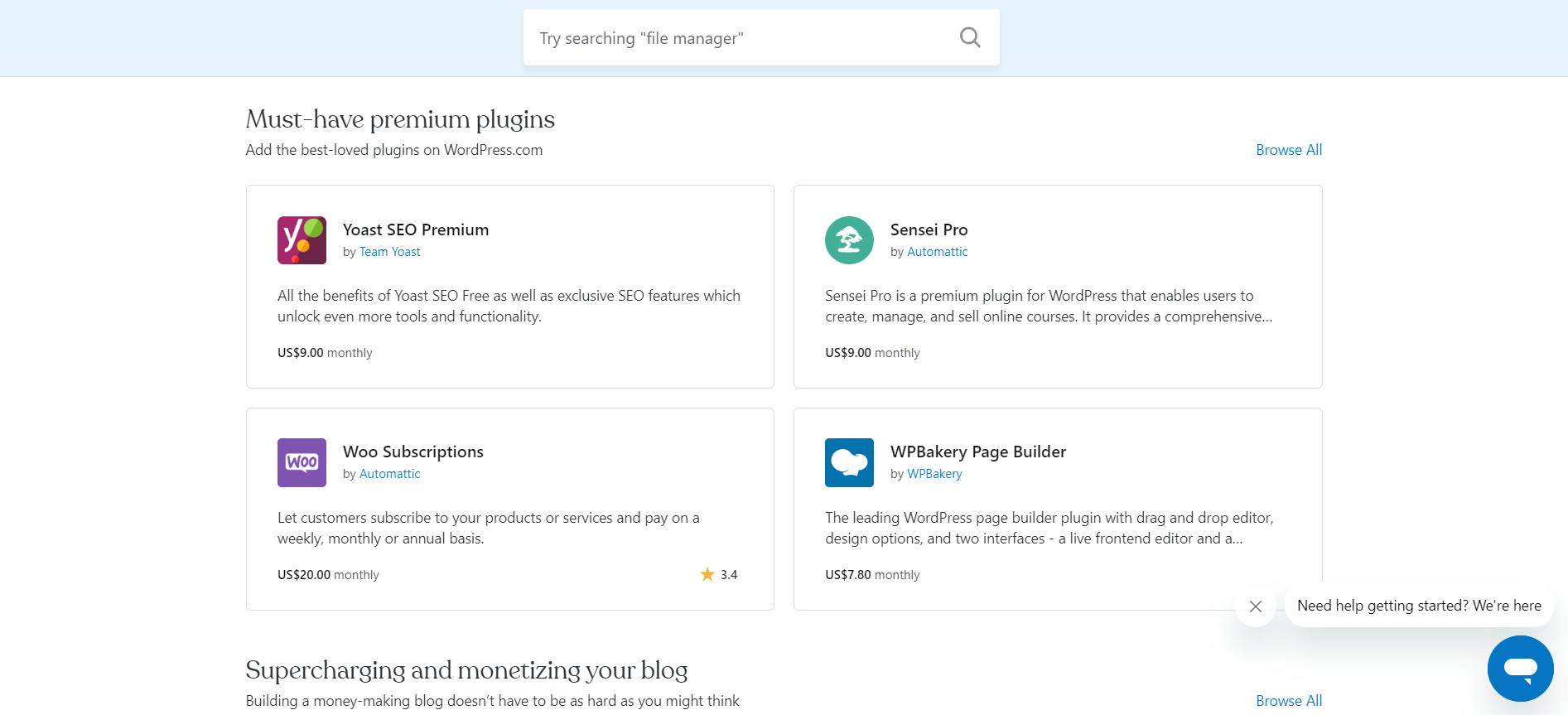
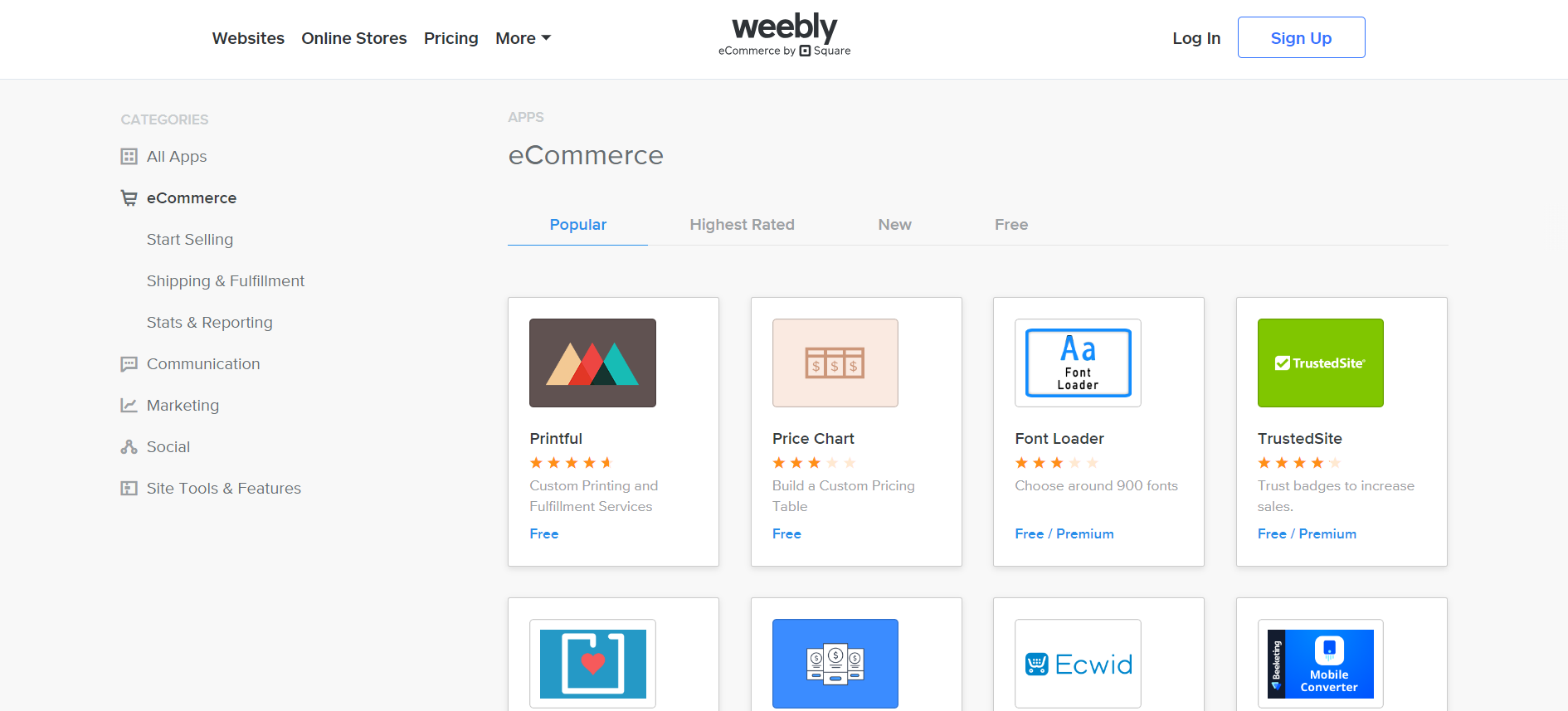
Marketing Features
Design FunctionalitiesRepresents how well each platform allows for creative design and customization of websites.Score Components:
- Template Variety (30%): Range and quality of design templates.
- Customization (30%): Flexibility and options for design alterations.
- User Interface (20%): Ease and intuitiveness of the design process.
- Responsiveness (10%): Adaptability to different devices and screen sizes.
- Innovation (10%): Unique design features and tools.
 8.0
8.0
 7.1
7.1
🏆
Overall Winner: WordPress
. WordPress edges out Weebly with a higher marketing features score and a more extensive range of plugins for customization. However, Weebly’s built-in capabilities and user-friendly interface make it a strong contender, especially for beginners.

|

|
|
|---|---|---|
|
SEO Tools |
|
|
|
Email Marketing |
|
|
|
Blogging |
|
|
|
Social Media Integration |
Plugins for direct linking, automatic posting, and social feeds display |
Easy link to social media accounts and share buttons |
|
Analytics and Reporting |
In-depth analysis via plugins like Google Analytics for WordPress |
Built-in analytics for tracking site performance |
|
Ads and Promotions |
Support for Google Ads and ad management through various plugins |
Integrated marketing tools for creating and managing ads |
Customer Support
Customer supportEvaluates the quality and availability of support options.Score Components:
- Response time (40%): Speed of support responses.
- Support quality (30%): Effectiveness and helpfulness of the support.
- Availability (20%): Range of support channels (phone, chat, email).
- Resource richness (10%): Quality of self-help and educational materials.
 5.0
5.0
 7.3
7.3
🏆 Winner: Weebly
. In the comparison of WordPress vs Weebly, Weebly stands out with a higher customer support score of 7.3 compared to WordPress’s 5.0. Weebly offers a variety of support options, including an extensive Online Help Center, Community Forum, Email Support, Live Chat during limited hours, and Phone Support for Pro and Business plan users. This comprehensive support system ensures that users can find help through multiple channels, making it easier to resolve issues efficiently.
WordPress, being an open-source CMS, lacks direct customer support. Users rely on community forums, the WordPress codex, hosting provider support, and plugin and theme support for assistance. While this decentralized support system offers a wealth of information, it may not be as immediate or personalized as Weebly’s support options, which can be a drawback for users seeking quick resolutions to their problems.
Security
SecurityLooks at the platforms’ security measures and data protection.Score Components:
- Data protection (40%): Safeguards for user and customer data.
- SSL and encryption (30%): Implementation of secure connections.
- Compliance (20%): Adherence to industry security standards.
- Regular updates (10%): Frequency of security updates and patches.
 6.7
6.7
 8.3
8.3
🏆
Winner: Weebly
. Weebly takes a comprehensive approach to security, with measures including secure data centers, routine system updates, encryption through SSL certificates, compliance with PCI standards for secure transactions, automatic malware scans, spam prevention measures, robust password protection, optional two-factor authentication, and user permission controls. These measures collectively ensure a secure and reliable environment for individuals and businesses utilizing Weebly for website creation.
While WordPress also provides numerous functionalities and resources to enhance website security effectively, such as site backups, monitoring, malware scanning, user activity tracking, permission control, and spam protection tools, its approach to private data storage and protection can vary depending on the hosting provider, which can be a potential security concern.
AI Capabilities
AI capabilitiesMeasures the effectiveness of AI-driven features and tools.Score Components:
- Automation efficiency (40%): Impact of AI on streamlining processes.
- Personalization (30%): AI-driven customization for users or customers.
- AI-Assisted design (20%): Role of AI in website design and functionality.
- Data analysis (10%): Use of AI in interpreting user data and analytics.
 6.1
6.1
 1.8
1.8

|

|
|
|---|---|---|
|
AI Builder |
AI Site Builder, Zita |
|
|
AI Ecommerce |
Conversios, Ochatbot, AI Power, GetGenie, Woowoo, WooCommerce Multilingual, Rank Math, Yoast SEO |
|
|
AI Content Generation |
AI Engine, GetGenie, AI Power: Complete AI Pack |
Jasper, Copy.ai, ShortlyAI, Blogify, ShortlyAI Web App |
|
Additional AI Features |
Wide range of AI plugins |
Third-party AI plugins like Copy.ai and Jasper |
🏆 Winner: WordPress
. WordPress, with a score of 6.1, offers a wide range of AI capabilities through its plugins, making it a more flexible and customizable platform. It allows for integration of various AI plugins for tasks like website building, ecommerce, content generation, and more. On the other hand, Weebly, with a score of 1.8, doesn’t offer any built-in AI capabilities and relies on third-party tools for AI-powered features.
User Management
User ManagementAssesses the platforms’ capabilities in managing user roles, permissions, and accessibility.Score Components:
- Role Customization (40%): Flexibility in creating and defining user roles and
permissions. - Ease of Management (30%): User interface and tools for managing users.
- Access Control (20%): Effectiveness of access control measures for different user
levels. - Scalability (10%): Ability to manage a growing number of users efficiently.
 8.8
8.8
 6.5
6.5
🏆 Winner: WordPress
. WordPress and Weebly offer different approaches to user management.
- WordPress allows editing access based on user roles and additional controls. User roles, ranging from Super Admin to Subscriber, dictate the level of permissions, while plugins and controls such as role management plugins and revision control offer further customization for specific editing rights and collaboration.
- Weebly’s number of users permitted to edit a website varies depending on the plan selected. The Free Plan allows only one user, suitable for personal or simple projects, while the Personal Plan accommodates two users, making it appropriate for small businesses or collaborative efforts. The Professional Plan permits up to 10 users, catering to growing businesses or teams with specific roles, and the Business Plan offers unlimited user access.
WordPress User Roles and Access Levels:
| Role | Description | Access Highlights |
|---|---|---|
| Super Admin | Manages the entire network in WordPress Multisite. | Network admin, manage sites, users, plugins, themes. |
| Administrator | Full access within a single site. | Manage plugins, themes, users, all posts/pages. |
| Editor | Manages and publishes content, including others’ posts. | Edit/publish all posts, manage comments, categories. |
| Author | Publishes and manages their own posts. | Write, edit, publish own posts, upload files. |
| Contributor | Writes and edits their own posts but cannot publish. | Write, edit own posts (no file uploads or publishing). |
Weebly User Roles and Access Levels:
| Role | Description | Access Highlights |
|---|---|---|
| Owner | The primary account holder and creator of the Weebly site. | Full access to all site features, including design, pages, settings, store management, and analytics. |
| Admin | Users granted significant control over the site by the Owner. | Can edit and publish site content, manage store orders, view analytics, and access most site settings, except for site ownership transfer and account deletion. |
| Author | Users with limited permissions, typically focused on content creation. | Can create and edit blog posts, manage comments, and sometimes edit specific pages if granted permission. |
| Store Manager | Specifically focused on e-commerce aspects of the site. | Access to manage and fulfill orders, view store analytics, and edit product details, but cannot change site design or settings. |
Additional Features

|

|
|
|---|---|---|
|
SSL Certificate |
|
|
|
Custom Domain |
|
|
|
Free Custom Domain Included |
|
|
|
International Domains |
|
|
|
Mobile Responsive |
|
|
|
Page Speed |
|
|
|
Website Builder Mobile App |
|
|
|
Convert a Website To An App |
|
|
|
Website Analytics |
|
|
|
Multilingual Sites |
|
|
|
Multiple Users |
|
|
WordPress vs Weebly: User Feedback
WordPress receives praise for its user-friendliness, cost-effectiveness, extensive themes and plugins, customization options, and supportive community. However, users mention technical challenges, security concerns, a learning curve, and a lack of direct support. Overall, it remains a widely used and versatile platform, especially beneficial for startups and small businesses.
Square Online (formerly Weebly) receives positive reviews for its user-friendly drag-and-drop interface and quick website development features, making it suitable for small businesses. Users highlight its role in efficient appointment booking, saving time in coordination and scheduling. However, some express a desire for more advanced building tools and better pricing. The platform is recognized for streamlining website and payment operations, though opinions on customer service and design limitations are mixed. Overall, it is considered a good, affordable solution for small businesses.
The making of this blog
We followed a clear, step-by-step process to write and research this article.
WordPress vs Weebly: FAQ
Which platform is better for beginners, WordPress or Weebly?
Can I use both WordPress and Weebly for ecommerce?
How do WordPress and Weebly differ in terms of customization and design flexibility?
What are the major differences in pricing and value between WordPress and Weebly?










